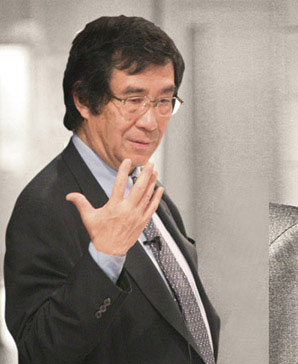Please join us on August 19, 2013 for a discussion on business ethics with renowned professors Klaus Leisinger and Josef Wieland, leading experts and contributors in the field of business ethics and corporate social responsibility. Led by Honorary CKGSB Professor Tu Weiming, the discussion will explore business ethics from the cultural, ethical and economic perspectives of experts from both China and Germany.
|
Speakers: |
|
|
Time: |
4:30-6:30 pm, August 19, 2013 (Registration starts at 4:00 pm) |
|
Venue: |
Classroom 9, 20/F, Oriental Plaza, Tower E2, 1 East Chang An Avenue, Beijing |
|
Language: |
English (with Chinese simultaneous interpretation) |
|
Please register through this link. If you have any questions, please contact Mr. Xiaolin Lu at xllu@ckgsb.edu.cn. |
|
Topic and Background:
Today, there is a widespread perception within China that the country faces a morality crisis, with shocking examples of corruption, immorality and neglect appearing in both traditional and social media on an almost daily basis. Confucius used to define such situations as “礼崩乐坏” (lǐbēng yuèhuài): an expression that signals a moral crisis caused by the collapse of tradition and rituals. During this event, we shall deal with the role of business in such a moral environment, and more specifically, how the business elite is affected, or is affecting, morality in contemporary China.
Despite their great financial success in recent years, some Chinese entrepreneurs and business leaders have felt that something is missing from their businesses and activities. They lack purpose. Mission. What are the root causes for this?
In German culture, rigorousness, discipline and diligence are often upheld as the core values of good business. How do such values affect the idea of corporate social responsibility in a German company, and how effectively are they upheld? What factors do German entrepreneurs base their decision-making on besides financial considerations? Do they face the same issues as their Chinese counterparts?
Both Germany and China have ethical business concepts embedded in their cultures. German business culture respects the idea of the “Honorable Merchant”, a businessman who is both virtuous and successful in commerce. China has the tradition of rúshāng (儒商), the Confucian scholar-businessman. Rúshāng are entrepreneurs who engage in commerce in accordance to the morals and teachings of Confucius, by placing a higher priority on social duty and ethics than on profit. Both concepts remind us, regardless of cultural or historical differences, that morality and business are not incompatible, and can be essential elements of the healthy economic and social development of a society.
On August 19, the 4th edition of the Cultural China & Global Citizen series will address these and other related issues. Joining Prof. Tu Weiming will be Prof. Klaus Leisinger, Chairman of the Novartis Foundation for Sustainable Development and Prof. Josef Wieland, Chairman of the German Business Ethics Network and winner of the Max Weber Prize for Business Ethics. They will shed light on the importance of ethics in business from the cultural, economic and moral perspectives, while drawing on examples from both Chinese and German experiences, highlighting similarities, differences and areas where each culture can learn from the other.
About the Series
The Cultural China & Global Citizen Series was initiated by Professor Tu Weiming. In each of the series, Professor Tu will invite a guest who represents a unique culture to share their insights on their history, religion, society and culture with CKGSB’s students and alumni. CKGSB is the first and only business school to include humanities in its core management education curriculum, promoting humanism in leadership.
About the Speakers:
Dr. Klaus M. Leisinger is Chairman of the Board of Trustees of the Novartis Fundation for Sustainable Development (NFSD) and Special Advisor to the Chairman and CEO of Novartis. Klaus Leisinger is also Professor Emeritus of Sociology at the University of Basel, teaching topics related to international development and health policy, as well as business ethics, corporate responsibility, business and human rights.
Dr. Josef Wieland has been Professor of Business Administration and Economics, specializing in Business Ethics at the Hochschule Konstanz University of Applied Sciences (HTWG) since 1995. He is Head of the Constance Institute for Intercultural Management, Values and Communication and the Centre for Business Ethics. He was awarded the Max Weber Prize for Business Ethics in 1999. He is a member of the CSR forum established by the Federal Ministry of Labor and Social Affairs.
 TU Weiming
TU Weiming
CKGSB Honorary Professor; Chairman of the CKGSB Committee on the Humanities. Director of the Harvard-Yenching Institute; Harvard-Yenching Professor of Chinese History and Philosophy of Confucian Studies at Harvard University
Dr. Tu taught Chinese intellectual history, Chinese philosophy, and Confucian studies at Princeton University (1967-71) and University of California at Berkeley (1971-81). He joined the faculty at Harvard, where he continues to teach, in 1981. Dr. Tu has also been a visiting professor at Peking University, Taiwan University, the Chinese University of Hong Kong, and L’Ecole Practique des Haute Etudes. Dr. Tu holds honorary professorships from Zhejing, Renming, and Zhongshan Universities and the Shanghai Academy of Social Sciences and has been awarded honorary degrees by Lehigh, Michigan State (Grand Valley), and Shandong Universities.
He is a vice-president of the International Association of Confucian Studies, an international advisor of Rahman University in Malaysia, a member of the “Group of Eminent Persons” appointed by Kofi Annan to facilitate the Dialogue among Civilizations, and a fellow of the American Academy of Arts and Sciences.